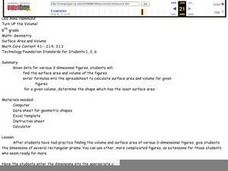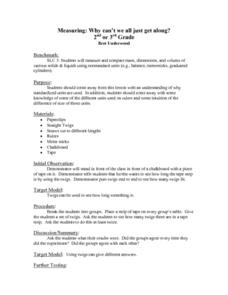Curated OER
Turn Up the Volume
Measuring volume can be a mystery for 5th graders, but this hands-on activity gives the gift of discovery. The volume of simple rectangular solids and irregular shapes are calculated through various methods including displacing liquid in...
Pace University
Volume and Capacity
Differentiated instruction through leveled learning contracts boosts scholars' knowledge of volume and capacity. Participants split into three groups based on ability and interest before choosing three activities from their learning...
American Chemical Society
Density: Sink and Float for Liquids
We don't think of liquids as floating typically, but a quick look at any oil spill tells a different story. Lesson explores various densities of liquids and why this fact is important. After observing the density variation, scholars...
Santa Monica College
The Density of Liquids and Solids
There are underwater rivers that flow on the ocean floor thanks to a difference in density. Scholars learn about the density in both liquids and solids in the second lesson of an 11-part series. They then determine the density of water,...
American Chemical Society
Density of Water
We know solids have a density we can measure, but what about liquids? Lesson explores this concept and allows scholars to explore the relationship between volume and density. Graphing and analysis questions round out the activity.
Teach Engineering
Floaters and Sinkers
Whatever floats your boat. Young engineers learn about density by measuring the masses and volumes of boxes filled with different materials. Using their knowledge of densities, they hypothesize whether objects with given densities will...
Baylor College
We Need Water
There's nothing quite like a glass of ice-cold, freshly squeezed lemonade. Lesson seven of this series explains how the water humans need to survive can come in many forms. Teach your class about how much water humans require every day...
Curated OER
Measuring: Why Can't We All Just Get Along?
Students examine why having standardized units of measurement is important. They investigate the use of non-standard measure, twigs, while measuring the piece of tape. Next, they experiment with straws, paper clips, and rulers before...
Cornell University
Buoyancy
Swimmers know to float by turning their bodies horizontally rather than vertically, but why does that make a difference? In an interesting lesson, scholars explore buoyancy and the properties of air and water. They test cups to see which...
NASA
States of Matter
Water, one of the basic needs of humans, is found in all three states of matter on Earth; no other planet—that we know of—possesses this quality. Here is a unit that allows learners to explore through experimentation what it takes to...
Curated OER
Activity #19 The Density of Alka Seltzer Gas
Students (teachers) complete the activity, they should not come in contact with Alka-Seltzer. They comprehend that the density of a gas can be calculated from its mass and volume. Pupils calculate the volume of gas generated by...
Curated OER
2nd Grade Physical Sciences
Second graders complete activities to measure motion and learn about the Earth's history. In this motion and Earth history lesson, 2nd graders discuss sound and complete a matching sound activity. Students then study the history of Earth...
Curated OER
Matter
Students complete a unit of activities to learn about states of matter and how to measure matter. In this matter lesson, students complete 8 lessons to learn about matter, its states, and how to measure matter.
Columbus City Schools
What’s Up with Matter?
Take a "conservative" approach to planning your next unit on mass and matter! What better way to answer "But where did the gas go?" than with a lab designed to promote good report writing, research skills, and detailed observation. The...
Curated OER
Physical and Chemical Properties of Matter
Learners identify the physical and chemical properties of matter. They review the types of matter. Students list the four states of matter (Solid, Liquid, Gas and Plasma). They recognize and describe the different types of matter.
Curated OER
Activity #6 'Nothing' Matters: A Demonstration
Students observe the 'pouring' of a gas. They compare the masses (weights) and densities of two gases. Pupils define the following terms: matter, mass, and density. Students answer questions after watching the demonstration.
Curated OER
The Solution to Pollution is Dilution
Students consider what happens to herbicides or insecticides that are used in agricultural practices, especially herbicides that are used to control noxious weeds. They become acquaint with a chemical assessment method known as...
Curated OER
The Grouchy Ladybug
Pupils complete a Cirlce Map about time. They recall times during the grouchy ladybugs travels, and add dots on ladybugs using turn-around facts. Pupils correctly sequence the events of The Grouchy Ladybug. Students compose new...



















